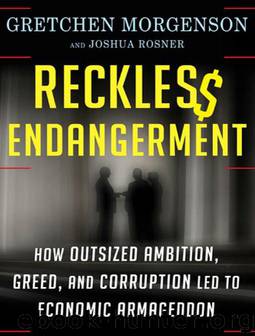Reckless Endangerment: How Outsized Ambition, Greed, and Corruption Led to Economic Armageddon by Gretchen Morgenson; Joshua Rosner

Author:Gretchen Morgenson; Joshua Rosner
Language: eng
Format: mobi
Tags: Economics, Business
ISBN: 9780805091205
Publisher: Times Books
Published: 2011-05-23T15:00:00+00:00
If the ratings agencies were doing excellent work on behalf of the banks and Fannie Mae and Freddie Mac, they continued to do shoddy work for investors and taxpayers. After the Basel Committee and the United States' top financial regulators gave the all-clear to issuers of private-label mortgage securities, the credit-rating agencies began developing models to help them assess risk in these instruments.
In 2002, for example, Moody's built a mortgage securitization computer model that analyzed risks in underlying loans. In this model, Moody's considered three types of information. The most crucial was what it called "primary" data, inputs such as loan-to-value ratios, property zip codes, borrowers' credit scores, and whether a loan was a first or second lien. This information was required for each loan in a security if Moody's was to rate it.
The next two levels of data were not required by Moody's; but the agency said if they were provided, they would help it
"supplement" its understanding of a borrower's risk profile. One of these was what Moody's called "highly desirable" information, including any cash reserves a borrower had on hand, his or her disposable income, whether the borrower was a first-time homeowner or had filed for bankruptcy recently.
Finally, there was the category Moody's labeled as "desirable"; it included the type of appraisal used to evaluate the property and which company had originated the loan.
Given these categories, it is clear that Moody's was not operating with a full deck. All of this information should have been required before a mortgage security could be rated. The fact that the agency did not demand that lenders provide a borrower's debt-to-income ratio—a prudent lending basic—or the type of appraisal that backed up the loan spoke volumes about how lax the agency was in its analysis.
For as long as there were mortgage loans, prudent lenders had used debt-to-income ratios to measure how financially stretched a potential borrower was. For generations, this metric was a key predictor of mortgage defaults. Moody's did not consider it to be crucial.
Then there was the matter of appraisals. With automated underwriting coming to dominate the industry, it was more crucial than ever to understand the quality of an appraisal backing a loan. If it was a drive-by appraisal or if it had been generated on a computer, the risks of an inflated valuation were far greater than if an actual human being had taken time to visit a property to assess it. Automated valuation models were also notorious for relying on outdated information; in a rising real estate market this did not matter so much, but in a falling market stale data could vastly increase a potential loss on a loan.
Finally, failing to require identification of the company making the loan meant Moody's was ignoring another hugely important piece of the puzzle.
Also troubling was the passivity with which Moody's went about getting the information it needed to make thorough assessments. Indeed, the ratings agencies relied almost exclusively on data provided to them by issuers rather than demanding that the loan packagers provide the information the agencies needed.
Download
This site does not store any files on its server. We only index and link to content provided by other sites. Please contact the content providers to delete copyright contents if any and email us, we'll remove relevant links or contents immediately.
The Black Swan by Nassim Nicholas Taleb(7106)
Bad Blood by John Carreyrou(6611)
Pioneering Portfolio Management by David F. Swensen(6288)
Millionaire: The Philanderer, Gambler, and Duelist Who Invented Modern Finance by Janet Gleeson(4465)
Skin in the Game by Nassim Nicholas Taleb(4239)
The Money Culture by Michael Lewis(4198)
Bullshit Jobs by David Graeber(4179)
Skin in the Game: Hidden Asymmetries in Daily Life by Nassim Nicholas Taleb(3989)
The Wisdom of Finance by Mihir Desai(3735)
Blockchain Basics by Daniel Drescher(3574)
Liar's Poker by Michael Lewis(3441)
Fooled by Randomness: The Hidden Role of Chance in Life and in the Markets by Nassim Nicholas Taleb(3105)
Hands-On Machine Learning for Algorithmic Trading by Stefan Jansen(3066)
The Intelligent Investor by Benjamin Graham Jason Zweig(3036)
Mastering Bitcoin: Programming the Open Blockchain by Andreas M. Antonopoulos(3035)
The Power of Broke by Daymond John(2975)
Investing For Dummies by Eric Tyson(2948)
You Are What You Risk by Michele Wucker(2760)
Market Wizards by Jack D. Schwager(2696)
